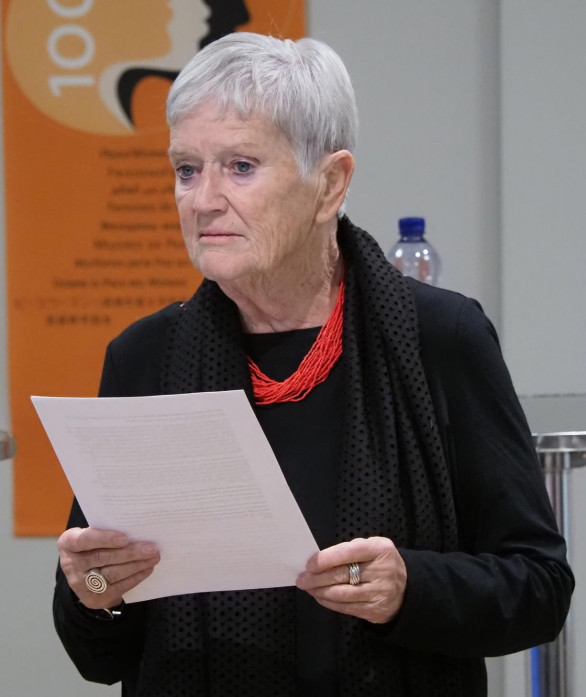07.04.2022, Rede von Ruth-Gaby Vermot-Mangold: "Now it's war" - in 40 countries
«Die Welt verbrennt unter unseren Füssen und wir sind bewegt, entsetzt, bleiben jedoch ruhig, korrekt und immer anständig», sagte unsere Präsidentin in ihrer Rede an die Mitglieder von FriedensFrauen Weltweit. Sie sagte auch: «Frieden schaffen wir damit nicht. Wie wäre es, wirklich laut, ungestüm und fordernd zu werden, den Männern die Waffen aus der Hand zu nehmen, den Kindern neue Vorbilder zu geben...» In ihrer Rede – die gleichzeitig ein Aufruf zum Handeln ist – fragt sie, «Warum sind wir Frauen nicht in der Lage, anzufangen und nicht aufzuhören, bis Friede ist?»

"Now it's war...", says my neighbour
"Now it’s war," said my neighbour a month ago, taking a deep breath as she leaned against the doorframe. She meant the war in Ukraine, the war on our doorstep. "There is always war," I reply. Yes, there is always war somewhere: in Armenia, in Azerbaijan, in Nagorno-Karabakh, Georgia, in Chechnya, then in former Yugoslavia, Bosnia and Herzegovina, Serbia, in Burundi, Afghanistan, Sudan, in Mexico, Syria, Nigeria, in the Democratic Republic of Congo, Ethiopia, Somalia, Mali, Iraq, South Sudan, Burkina Faso, Mozambique, Cameroon, Libya, the Philippines, Palestine, in India, in Niger. There is war in 40 countries – the world over. And we live with it. OK, the war on our doorstep bothers us a bit; perhaps we feel threatened, and then there is the worry about the supply of oil, gas and oligarchs’ money.
Micheline Calmy-Rey, our former foreign minister, who intervened when intervention was called for and who signed the letter nominating the 1000 PeaceWomen to the Nobel Peace Prize jury in Oslo, recently said in the SonntagsZeitung: "We cannot allow a few strong men to rule the earth" – "and allow them to destroy it blindly and wantonly ", one could add. They deal, they phone and the old men show muscle. They threaten and puff themselves up, all of them, even the good ones (if there are any). Behind them, they have immense stockpiles of war material and supposed security. They outdo each other in steadfastness and coolness. Let's stop this absurd display of influence and control!
In wars, the result is always the same: broken people, destruction of land, nature, villages and cities, generations of "missed childhood", distrust of every word. Peace, on the other hand, takes the basic needs of all people as its basis: health, education, food, human rights, security and more…
War is also an habituation. One becomes numb, moves on, no longer asks questions, especially about the future. We forget the misery when it disappears from the newspaper columns and reports. The damage is great. Shouldn't sensitivity and the guarantee of peace become an everyday message, like the unnecessary share prices?
We know the logic of war, it is simple: armament, hostility and ruthlessness, bringing the enemy to its knees. Defying the sanctions of other countries and recognising one’s own damaged population as collateral damage.
But what is the logic of peace? First of all, it is hard, relentless, dangerous work with many setbacks. Peace work often means discouragement and helplessness, not knowing how to go on.
While weapons reliably kill, words and agreements do not necessarily create peace. Agreements and signatures are volatile: they can be broken, reinterpreted, peace bridges destroyed. Peace processes are long and always fragile. Luz Guzman, who was the only rebel woman to participate in the Guatemalan peace process, said that on the first day of the peace process she had to shake hands with her mortal enemy, General X. Only then were they negotiating partners. A frightening moment for Luz, which she mentioned again and again.
PeaceWomen Across the Globe has stood for peace processes, peace work and a peace mindset since its foundation. We encourage women in peace processes. Together we have instruments, good ideas, a growing network and criteria. We walk the paths of peace with committed women. We know our partners and trust each other. All good. And yet we are slow, we don't move forward - I don't just mean the active organisations, I mean us women worldwide. There are 40 war-torn places, with millions of women and yet they are missing from the peace processes, sorely missing. Why are we women unable to start - and then not stop until there is peace. Why do we allow ourselves to be scarred by these wars? Why are we so quiet, so demure, despite our education, self-confidence, wisdom and networks?
In 1919, 50 women from all those countries involved in the First World War gathered in Zurich. They never wanted war again and demanded that the masters who decided on peace in Versailles not only celebrate the victors and the vanquished, but also build the future. They demanded that the voices of all the women of the warring countries be heard and their demands met. Among them were women like Anita Augspurg from Germany, Jane Addams from the USA and many others. Clara Ragaz was there for Switzerland and quite simply demanded humanity.
I am impatient. The world is burning under our feet and we are moved and horrified, but remain calm, correct and always proper. We will never create peace like this. Simply never. How about getting really loud, boisterous and demanding, taking the weapons out of men's hands, giving children new role models....
Let's organise a new women's peace conference by bringing women from all of today’s war-torn countries and letting them speak. As one of the PeaceWomen from Nepal said: "We demand recognition, we demand our voices be heard. We demand security. We demand a future for our children. We demand truth. And we demand justice. Now."
The speech was delivered on the occasion of the PWAG General Assembly on 1 April 2022 in Bern. If you would like to become a member, you can find out more here:
Earlier and later events
Previous post: